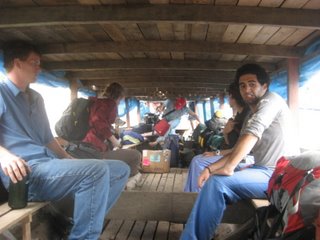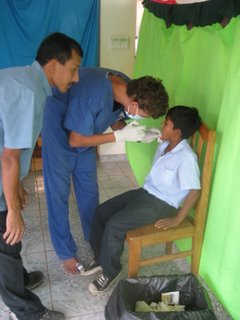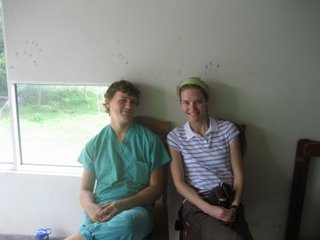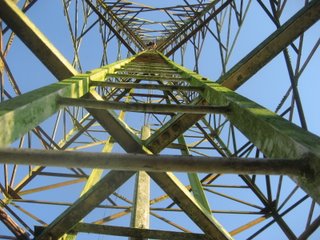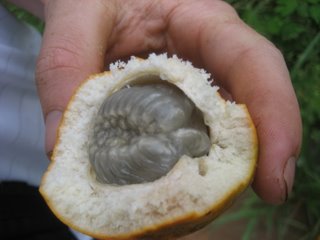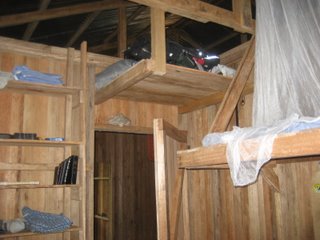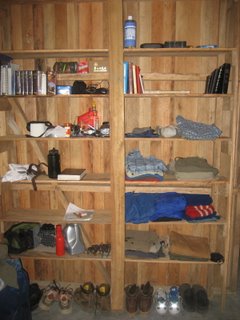This past week, we spent working in a clinic in the town of Masisea, adjacent to the river Ucayali, one of the headwaters of the Amazon. This describes the various experiences we had getting there and away.
Getting there was fairly uneventful. We all took moto-cars to the river, where we boarded a "Fast Boat" bound for Masisea. A fast boat is essentially a skiff equipped with an outboard motor. The motor is usually 40-50 hp. The stifling heat was only alleviated by the breeze created by the motion of the boat. It took us about 2 hours going upstream to reach the port. Once there, we had to haul all our dunnage up a steep muddy slope to where some moto-cars were waiting to take us to Masisea. We took a 20 minute ride through massive Papaya groves to reach the town. Once there, we set up clinic in the towns virtual library, or "Biblioteca Virtual".
The week went by very well, we treated about 130 patients a day, both medical and dental.
The return trip was more eventful, due in part to the fact that we chose to take a "Peki-peki", one of the ubiquitos boats of the Amazon. The peki-peki is the local commuter, used much the same as a metro, tube, or local bus line. The locals here use it to travel between the small river towns. The dimensions of the peki-peki are as follows: Usually 40-50 feet in length, and 8-10 feet wide, with a rounded hull and a canopy over top for the protection of the passengers from the elements. The peki-peki is equipped with a singular type of motor, it is an outboard motor with a long (10-12 feet)propeller shaft which lies almost horizontal to the water, as opposed to the vertical shaft of a normal outboard. The reason I was able to come up with is this: it is easy to lift the entire apparatus out of the water to clear it of river weeds and other flotsam. All the driver has to do, is stand on a peice of rebar welded into the motor for this purpose, and it lifts it entirely out of the water.
We loaded all our gear into the peki-peki, and set off. A little ways down the river, and we met another peki-peki which offloaded a considerable portion of it´s passengers onto us (midstream) who wanted a ride to pucallpa. The bumbling roar of the peki-peki motor prevented me from sleeping, so I attempted to observe my surroundings. On both sides of the river, the Jungle rises up, green, thick, and palpably alive, it´s continuity broken only by the occasional thatchroofed hut. The muddy water of the river swirls lazily along it´s way; although this sentence is deceptive, since I coincidentally sense the exceptional power and strength of the current. Occasionally, another river boat will pass us, it´s motor filling the air with noise until it passes, and then the sound slowly dies away into nothing, swallowed up into the past.
Then there is a new sound, the sound of rain. I wonder if it will get stronger, and then notice that it is stronger already, the big drops beating a weird rhythm on the metal roof of the peki-peki. Our ride stretches on into the night, and I become progressively tired, slumping down on my hard wooden bench. Finally we see the lights of Pucallpa, and know that our trip is almost over.
Once we landed, the doctor and jenni went in search of a truck to bring us and our baggage back to the mission headquarters. They made it back in about half an hour, and then we had to haul our stuff up a nearly vertical mud slope to the waiting truck.
A short ride later, and we were back at the mission, our journey finished.
The view from the fast boat, on the way to Masisea.

The side of the Peki-peki, on the return journey.

A small village we passed, peki-peki in forground.

The interior of the peki-peki. Alex (left) and Anthony (right) in the foreground.
